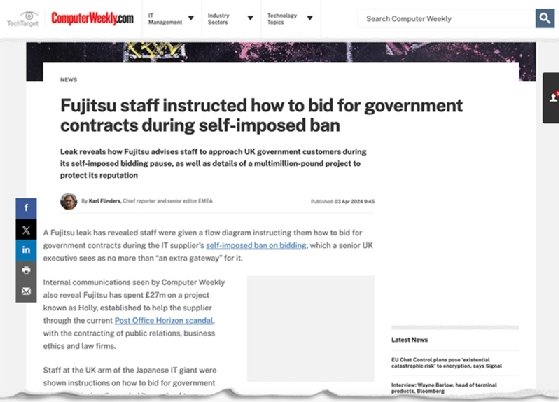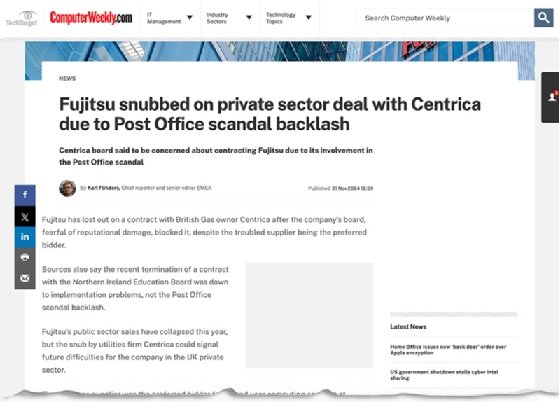The Post Office scandal began in the late 1990s, when the organisation rolled out Fujitsu’s Horizon computer system across its branch network.
What unfolded over the next half-century is at the centre of public debate today, but this was not always the case. For years, Horizon issues and the plight of subpostmasters were investigated and reported on by Computer Weekly, with little public interest.
ITV’s Mr Bates vs The Post Office dramatisation of the suffering of subpostmasters changed that.
It also finally made life less comfortable for Fujitsu, which had refused to answer Computer Weekly’s questions over the previous 15 years.
It was 2009 when Computer Weekly first revealed the stories of seven subpostmasters and how they had suffered at the hands of the Post Office, after experiencing unexplained account shortfalls on its computer system.
But it wasn’t until the ITV drama, at the beginning of 2024, that public fury dragged the IT giant out of hiding.
What was Fujitsu’s role in the scandal?
It was Fujitsu’s takeover of British computer firm ICL in 1998 that gave it the Horizon contract with the government-owned Post Office.
Horizon has an electronic point of sale service (EPOSS) that enables subpostmasters and branch workers at more than 18,000 Post Office branches across the UK to key in sales on a touchscreen, with the accounts being automated in the background. At the time of its roll-out in 1999-2000, which replaced mainly paper-based processes, Horizon was the largest non-military IT project in Europe.
Soon after the system’s introduction, however, subpostmasters began reporting unexplained shortfalls. Under their contract with the Post Office, the subpostmasters were liable for losses. Between 2000 and 2015, about 900 of them were convicted of financial crimes based on evidence from the Horizon system.

Fujitsu knew the system had errors that could cause unexplained losses, but gave evidence in court during prosecutions of subpostmasters claiming Horizon was robust and could not have caused the shortfalls that the subpostmasters were being blamed for.
When forced to, at a Post Office Horizon scandal public inquiry hearing in 2024, Fujitsu’s European boss, Paul Patterson, admitted that the IT company missed an opportunity to take action and prevent subpostmasters from being convicted.
In the past, Fujitsu had defended the Post Office’s irrational position that Horizon did not cause errors, or just kept its mouth shut. The Post Office and Fujitsu had a tense relationship, but were joined at the hip when protecting their brands. But after the ITV drama, they began to “fight like rats in a sack”, as one campaigner described their post-drama relationship.
Fujitsu’s silence on errors and its support of the Post Office’s position that Horizon was robust gave credence to the Post Office’s lies and enabled it to wreck lives for nearly two decades.
How did the ITV drama about the scandal change things for Fujitsu?
When the Mr Bates vs the Post Office mini-series ended, the nation was united in its disgust. The government, which owns the Post Office, was fearful that the public backlash would force it to act quickly.
For example, unprecedented legislation to overturn wrongful convictions based on Horizon evidence was quickly put through Parliament. Significantly, it also meant that Fujitsu was finally forced to answer questions.

During a Parliamentary select committee hearing just weeks after the drama aired, Patterson said Fujitsu was “morally obligated” to contribute to the costs related to the Post Office Horizon scandal.
Days later, in a split from its partner in crime, the Fujitsu boss told the public inquiry that the Post Office’s behaviour was “shameful and appalling”.
Hollow bidding pause
The supplier also made what has been described by peer Kevan Jones as a “hollow gesture” when it promised to pause bidding for government contracts.
The company, which earns billions of pounds in UK government contracts, sent a letter to the Cabinet Office outlining Fujitsu’s “voluntary undertaking not to bid for government contracts whilst the inquiry is ongoing, unless, of course, the government asks them to”.
But it did not say it would not continue to serve existing customers and bid for lucrative extensions to these contracts.
Furthermore, Fujitsu had an internal plan to lessen the impact of the bidding pause, and was, as revealed by Computer Weekly, still eyeing a huge UK government bounty.

Computer Weekly also revealed Fujitsu’s workaround for its own bidding pause, calling into question the company’s gesture. Fujitsu staff were actually instructed how to bid for government contracts during the self-imposed ban. In a flow diagram sent to staff, instructions advised staff that if a public sector body is not an existing customer, rather than pull out of the bidding, they can look to see if they have a unique selling point. Failing that, staff were told to ascertain whether there is potential for a failed procurement if they pull out, and if so, they should “escalate to Fujitsu’s head of public sector to raise with the Crown Representative”.
Computer Weekly also revealed a Fujitsu staff forum answer to the question about the ban on bidding. Dave Riley, then head of public sector at Fujitsu UK, told an employee it was not an outright ban, but another “gateway”, and that Fujitsu already has hundreds of millions of pounds worth of backlog of contracts to be delivered.
MP Liam Byrne called on Fujitsu to put actions behind the promises it had made to MPs, victims of the Post Office scandal and UK taxpayers, and stop bending rules, stop bidding and pay up what it owes for the damage it partly caused.

Compensation delays
Fujitsu did promise to pay its bit towards scandal costs at the beginning of 2024, when it was cornered by an angry public and terrified government. The company stated it was “morally obliged” to contribute to subpostmasters financially.
But Fujitsu was not forthcoming with any figures and simply kicked the can down the road, despite MPs demanding it be “nailed down” on its financial promise.
In fact, Byrne said Fujitsu should pay half of the Post Office scandal costs, while peer Kevan Jones demanded Fujitsu cough up a £300m interim payment.
Fujitsu also agreed to support former subpostmasters’ families beyond financial redress, but was accused of “paying lip service” to Post Office scandal victims.
The scandal is costing UK taxpayers billions of pounds in compensation payments to victims, government and Post Office legal costs, as well as millions upon millions of pounds for keeping Horizon going and paying for its replacement.
Customer backlash
In the meantime, Fujitsu has continued to rake in huge amounts of taxpayer cash. According to figures from Tussell, the UK public sector as a whole spent about £450m with Fujitsu in the last financial year, with the Home Office its second biggest customer, which spent £78m in that period. But the backlash of its involvement in the scandal is biting.
In April 2024, the Environment Agency dumped Fujitsu, and in the same month, the supplier announced job cuts. By September, Fujitsu had lost £50m in sales.
In January 2025, Fujitsu ordered its UK staff to cut costs amid widening losses. As revealed by Computer Weekly, during a company conference call in September last year, Dave Riley, then head of public sector at Fujitsu, told staff that media coverage of the scandal had cost Fujitsu’s UK public sector operation £50m-£60m in lost potential revenue.
And it wasn’t just the public sector getting itchy feet. In November 2024, the supplier was snubbed on a private sector deal with Centrica due to the scandal backlash.

The backlash continues, and major public sector customers are gradually moving business away from Fujitsu. For example, in July 2025, the Home Office dropped Fujitsu from an IT services contract, and HMRC is in the process of replacing Fujitsu in a huge datacentre contract.
Neither public sector organisations nor private sector organisations want to be linked to the disgraced supplier. In fact, campaigning peer James Arbuthnot warned suppliers against partnering with Fujitsu in contracts.
Sources revealed to Computer Weekly that internally, Fujitsu UK is braced for a major revenue decline.
But for now, cash continues to roll in, with government departments and even the Post Office heavily reliant on its services.
In May 2024, Fujitsu won a further £180m deal, and in November the same year, the Post Office requested a four-year Horizon extension.
HM Revenue & Customs, Fujitsu’s biggest government customer, has been a cash cow for the supplier for many years. For example, in March 2025, the supplier raked in £80m from the department alone.

Conflicts of interest
The public sector is not only dealing with reputational pressure by working with Fujitsu, but it is also creating serious conflicts of interest.
Perhaps the most concerning conflict of interest is the work it does for UK police, while it is being investigated itself as part of a nationwide probe into the Horizon scandal, known as Project Olympos. As revealed by Computer Weekly, the investigation faces conflict of interest questions over Fujitsu’s role in operating the network used by separate police forces to share information.
The Law Enforcement Community Network (LECN) uses networking equipment and encryption technology to provide secure connectivity between forces.
Furthermore, the Metropolitan Police Service, which leads Project Olympos, also has a direct contract with Fujitsu. A freedom of information (FOI) request by Computer Weekly revealed a sub-contract between Fujitsu and the Met Police. According to the FOI request response, a sub-contract in the Met’s deal with DHL Supply Chain, to provide Met police officers with uniforms, sees Fujitsu supply and support the online ordering platform, known as Uniform Hub.
Through the Uniform Hub contract, Fujitsu captures, stores and processes human resources files that contain information relating to officers. The data includes personal and employment details such as employee number and user ID, name, email address, gender, hire date and termination date if relevant. It also includes information on what Met police officers are working on, the start date of current assignments, rank bands and job roles.

Investigation and legal challenges
The Metropolitan Police’s Project Olympos investigation is just one of the many legal challenges facing Fujitsu. Its former staff have already been investigated for potential perjury offences committed during the trials of subpostmasters prosecuted for financial crimes.
The Post Office scandal public inquiry also questioned Fujitsu and its staff. In fact, it has been revealed that a Fujitsu analyst gave witness statements when more qualified colleagues refused. It also revealed that a former Fujitsu worker, who gave evidence at a subpostmaster’s trial, warned company bosses against staff doing so again.
The public inquiry’s initial report, which focused on the human impact of the Post Office scandal, was not easy reading for Fujitsu. The IT supplier was linked to the suicides of 13 people. Public inquiry chair Wyn Williams said he could not rule out the “real possibility” that 13 people took their own lives as a result of their treatment by the Post Office after they suffered unexplained shortfalls in their branches, while using Fujitsu’s Horizon system.
In the first part of the Post Office scandal public inquiry report, published in July 2025, chair Williams ordered Fujitsu and the government to publish a plan for a restorative justice programme by the end of October 2025.

Fujitsu will be facing more lawyers in the foreseeable future, with former subpostmaster Lee Castleton announcing he is suing the Post Office and Fujitsu for a judgment “obtained by fraud”. The supplier is clearly taking steps to prepare for legal action, telling all UK staff to preserve documents related to its work with the Post Office.
Despite all this, Fujitsu still runs the Horizon system for the Post Office, and the system is still experiencing problems, with a crash in August 2024. A Fujitsu outage also crashed the Post Office Horizon system in July this year.
In fact, a survey in September 2024, commissioned by the Post Office Horizon IT Inquiry and carried out by YouGov, revealed 57% of current subpostmasters have experienced unexplained shortfalls, including 19% reporting unexplained transactions and 14% having had transactions go missing.

According to a freedom of information response from the Post Office, in the past two years, subpostmasters identified more than 16,000 discrepancies, including account shortfalls and surpluses.
The taxpayer-owned business wrote off £11.6m in unidentified shortfalls recorded on the Horizon system as a loss in its most recent financial results, for 2023/24. In the previous financial year, it wrote off £10.4m as losses for the same reason.
These are shortfalls where the Post Office cannot identify the cause.
Numbers from the 11,500 branches reveal that more than 6,000 shortfalls were reported in the Post Office’s most recent figures, worth over £17m. In the previous financial year, there were about 5,800, adding up to about £19m.
Fujitsu boss Patterson told the public inquiry in November 2024 that the Post Office scandal was not caused by software errors. In a hearing back then, he said: “I have now spent the last seven months listening to evidence…. The notion that this is all down to a software bug, which has contributed to the largest miscarriage of justice in UK history, is incorrect,” he added. “These are complex matters based over many decades, and we have learned as an organisation a great deal about the causes of this miscarriage of justice.”
Fujitsu’s 30-year contract with the Post Office comes to an end in March 2026, but that will not conclude this story.
• Also read: Post Office Horizon scandal explained – everything you need to know •
